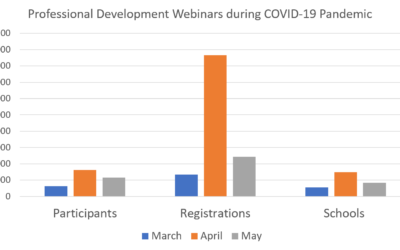News article written by EVBB Member Mrs. Danguolė Bylaitė-Šalavėjienė, from the Vytautas Magnus University (VMU), Education Academy, Institute for Professional Development, Lithuania.
The COVID-19 pandemic and the introduced quarantine in Lithuania have brought unplanned rapid changes in the field of education. As schools switched to distance learning, the only way we could reach educators and provide professional development services was to conduct distance learning. The team of the Institute for Professional Development from the Vytautas Magnus University (VMU) remained active throughout the quarantine period and was organizing webinars, online consultations, online conferences, online research activities remotely from home.
From the 16th of March to the 31st of May in total 51 webinars were organized for teachers and school leaders, educational support professionals. In total 3397 participants from 2870 schools attended webinars. Regular consultations for educational support specialists were organized in cooperation with the Social Educators‘ Association. The events were attended by 456 support specialists. We involved not only the lecturers of Vytautas Magnus University, but also social partners who agreed to conduct webinars for free. The webinars attracted a great deal of interest, so we held repeated sessions. We used Adobe Connect to conduct the webinars, but due to the limited capabilities of the Adobe Connect software, we could not accept everyone. In total there were 12410 registrations to webinars. We sent videos of the webinars to those who did not have the opportunity to participate in the events directly.
In March, the webinars “Virtual School – Mission Possible (The Northern Lyceum Good Practice of Working with Primary School Students)” and “Physical and Health Education in a Virtual Environment: Practical Recommendations” attracted the most interest.
In April, the most relevant topics were: “Inclusive School: Mission Possible”, “Mathematics for Beginners: Developing Problem Solving Skills”, “Helping the Teacher: Lesson Planning”, “Sway Microsoft Office Tool for Distance Education in Kindergarten”, “STEAM Distance Education”, “Language Learning SmartClass”, “Labour Relations at School and Other Educational Institution During Quarantine”,“Zoom Functionality in Distance Learning”.
In May, the pedagogical community discussed relevant issues in the webinars: “How Not to Lose Yourself in a Challenging Day”, “Modern Lesson Management in Distance Learning”, “Professional Path from Educator to Head of Educational Institution”, “Genial.ly and Mentimeter.com Tools Primer”, “Types, Forms, Causes and Consequences of Domestic Violence for the Victim”, “Brain Activity Based Learning”, “Principles of Actors’ Techniques for Teacher Work” and “Development of Sports Skills”.
The dynamics of participant registrations shows that Lithuanian educators faced the biggest challenges in the heat of the COVID-19 pandemic (end of March – April 2020). During this challenging period, the Institute for Professional Development team sought to respond to the needs of the educational community.
 Source: Own elaboration, Institute for Professional Development data, 2020
Source: Own elaboration, Institute for Professional Development data, 2020
During the quarantine, the team of the Institute for Professional Development worked actively in preparing the project under the measure “Development of Formal and Non-formal Learning Opportunities” No. 3 09.4.2-ESFA-K-714-03. We contacted the heads of schools, teachers and municipalities, inviting to sign tripartite cooperation agreements between the university, local municipality and a teacher of the school. We invited teachers to study a second subject or acquire a pedagogical qualification. This measure will make it possible to finance in-service training for teachers, with a commitment to secure a teacher’s job for at least 2 years after the end of the project. Vytautas Magnus University offers different retraining programs for teachers in Kaunas and Vilnius: Natural Science modules (Physics, Chemistry, Biology, Geography); Science modules (Mathematics); Language modules (English, Lithuanian, Polish); Pre-School Education module; Primary Education module; History module; Technology module; Art Education modules (Dance, Music, Art, Theatre and Film); Physical and Health Education module; Social Pedagogy module; Special Pedagogy module; Religious Pedagogy module; Informatics module. At the beginning of June, about 300 tripartite cooperation agreements were signed. The most popular modules included: Pre-School Education module; Physical and Health Education module; Art Education modules (Dance, Music, Art, Theatre and Film); module of Religious Pedagogy.
In April 2020, during the COVID-19 pandemic, the team of the Institute for Professional Development joined the World Education Leadership Symposium and Network initiative to conduct the survey “School Barometer (Experiences, Opinions, Needs and Demands) – COVID-19 and Current Challenges in Schools and Education”, initiated by Prof. Dr. Stephan Huber and the SchooBa-team, University of Teacher Education Zug, Switzerland. International partners offered to use the School Barometer (SchooBa) platform for exchanging experiences and know-how in the extremely challenging current situation due to the COVID-19 crisis. The team of the Institute for Professional Development distributed the School Barometer tool to 1,500 schools in Lithuania. For more detailed information about the tool see: www.School-Barometer.net and WELS.EduLead.net/School-Barometer
In May 2020, the team of the Institute for Professional Development in cooperation with the social partners, organized an international online conference “Challenges for Mathering 2020: Social Policy and Education“. The experts from Lithuania, Poland, Latvia, Ukraine, Turkey, Morocco, Tajikistan, Nigeria, Syria, Afghanistan came together online to discuss challenges and solutions for families and schools in the COVID -19 situation. The core aim was to share ideas, knowledge, and experiences. The conference was held online Adobe Connect programme. Over 60 participants took part in the international online conference “Challenges for Mathering 2020: Social Policy and Education“. The conference materials will be published in journal “Social Education”.
The COVID-19 pandemic was a challenge for the team of the Institute for Professional Development. We needed to find the new ways how to reach our target group, how to help school communities, how to ensure continuation of going international cooperation activities. The team has managed to find creative ways of working from the “university at home” as well as to stay safe and productive. Digital online means were used in all the activities implemented during the COVID-19 pandemic.
By Mrs. Danguolė Bylaitė-Šalavėjienė
Vytautas Magnus University (VMU), Education Academy, Institute for Professional Development, Lithuania
Email: danguole.bylaite-salavejiene@vdu.lt

